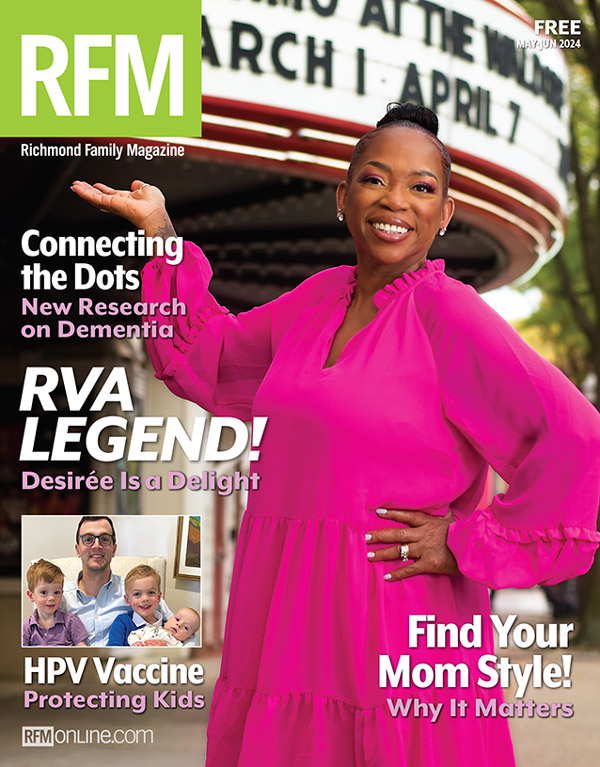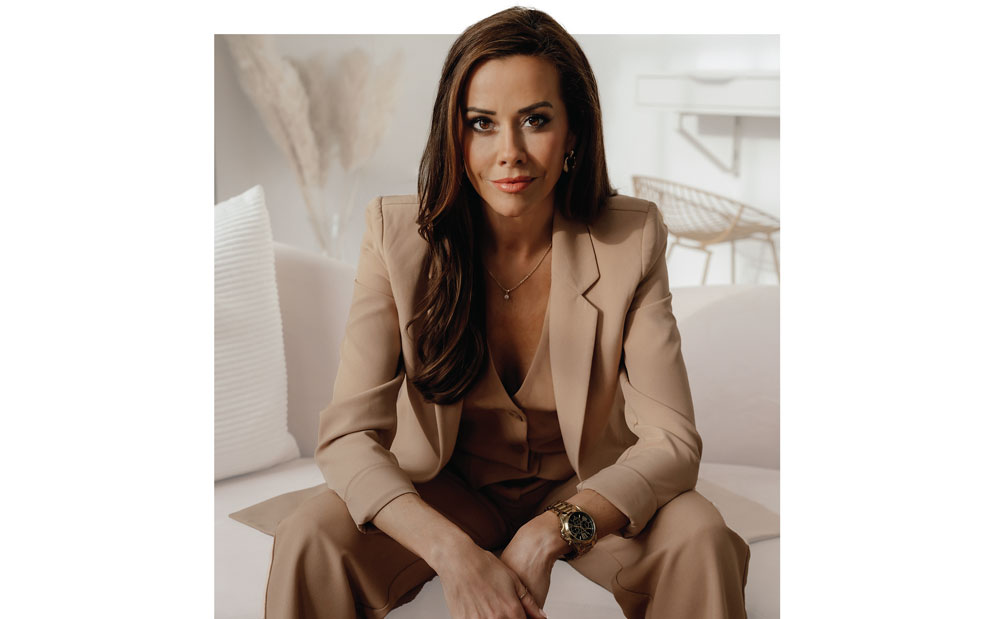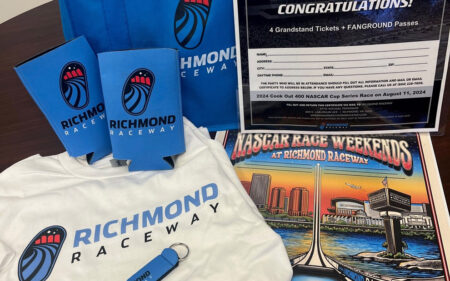Lori Waran is a builder. She’s not building houses – no lumber or hammers here – but she can build an organization and an audience by using her coveted skill set. Her vision for completing the task at hand may not always follow the norm, but her track record in business speaks for itself.
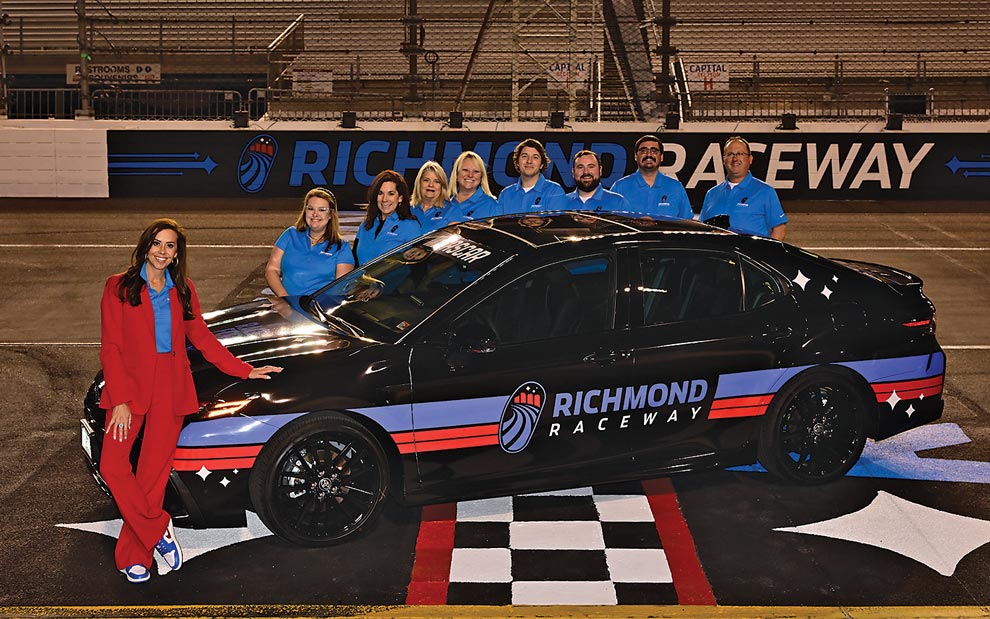
“I enjoy leading teams,” says Waran, Richmond Raceway’s president since June 2022. “I think I have a unique perspective of how to help a business grow and take it in a different direction, [while still maintaining] the audience the organization had.”
Waran has proven her methods over the years in publishing and communications – think AutoTrader Magazine, Style Weekly, and Virginia Business. Now there’s work to be done at Richmond Raceway.
Unlike her career in publishing, Waran is operating in a historically male-dominated industry. Change may be on the horizon, however. NASCAR, founded in 1948, is embracing diversity in all areas, from its drivers and pit crew to its employees and the fans it seeks to attract. And, that’s where Waran’s building skills come into play.
She doesn’t see gender or ethnicity when she is sitting in a meeting or walking through the crowd of fans; she sees individuals with common interests and goals. “We are the most diverse audience of all of the NASCAR tracks now. And, that’s a new thing for Richmond. The fact that we are in the former capital of the Confederacy and we can claim [a diverse audience], that’s huge. I’m really proud we can do that,” she says.
According to Waran, one of the sports industry’s biggest hurdles at the moment is changing fan behaviors that started during the pandemic. “The pandemic trained the mindsets of audiences to enjoy watching sports in the comfort of their homes. When screens are so engaging and interactive, it’s hard to pull yourself away from the comfort of your home to want to go and experience it in a live format,” she says.
Addressing this type of dilemma fuels Waran’s creativity. “I have always been up for a challenge. I love it,” she says.

Lasting Memories
Waran’s tenacity stems from her upbringing. She grew up in Hanover County, where she still lives with her husband, Jeff, and two sons – one getting his master’s degree at Virginia Tech and the other in high school.
As a child, both her parents were high school principals in Henrico County. “Luckily, I didn’t have to go to school in the same county,” she says.
She is the firstborn in her family that includes two siblings. Her brother now works in the Spotsylvania school system and her sister was a teacher; both followed in their parents’ chosen field.
“Growing up as a child of two high school principals was interesting,” Waran says. “I needed to make sure I was doing all the things you needed to do to be a good student.”
She got good grades, participated in school sports, was the lead in the high school play, and was president of her class. “You had to succeed. There wasn’t an option not to. I came from a very loving household, but one with high expectations,” she says.
Her parents believed in leading by example. “My father came from the mindset that if you fall down, rub some dirt on it. If you get a bad grade, rub some dirt on it. It was loving, but it was tough love – a tough and sweet love,” she adds.
Her mother always encouraged Waran to advocate for what she wanted. She also depended on Waran to help out with her younger siblings. Even though Waran didn’t see it at the time, she was learning through osmosis.
“All those things built character and helped form leadership abilities,” she says. “Those are all great things to have. You don’t realize those are the bricks in the foundation.”
Her parents also taught her the value of time spent with loved ones. “What I loved about my parents is even though they were incredibly busy, they got to all the activities my brother, sister, and I had,” she says. “They modeled for me what I needed to do and how to be present for my two children now.”
Interspersed with those recollections of her parents are memories of her grandfather in particular. When she was very young, about three or four, she stayed with her grandparents when her parents were working at special functions. Her grandfather volunteered to park cars at the State Fair of Virginia and at Richmond Raceway (then known as Richmond International Raceway), and Waran was his tiny shadow.
“He would say, ‘Come on, Shuga, let’s go on and park some cars!’” She recalls that she wasn’t much help. “I would sit on his shoulders and mimic his direction to the cars.”
She also remembers the waves of smells – warm funnel cakes fresh out of the fryer at the Fair and the smell of hot rubber at the racetrack. “It’s cool to come here now every day,” Waran says about her job at Richmond Raceway. “If you get a whiff of that fragrance at event time, it takes you back in time.”
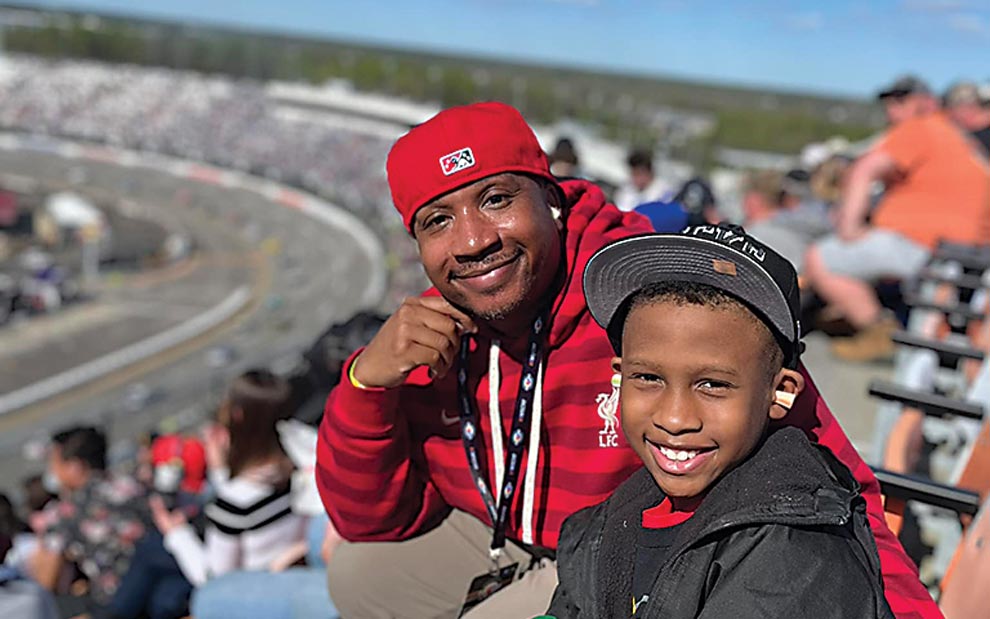
Waran’s Career Track
Waran got her introduction to the working world between her freshman and sophomore years at the University of Mary Washington when she worked for a D.C.-based dinner cruise company, Spirit Cruises, which was owned by Sodexo Marriott.
A theatre major in college, Waran auditioned for the show on the Spirit
of Washington.
“I loved being there. They offered me more of a full-time job to choreograph and audition other theatre majors for their vessels. That turned into a job as hospitality manager and then business manager with the company. I worked there for eight years,” she says, adding that is where she met her husband Jeff.
After she and Jeff married and had their first son, they decided to look for new jobs in the Richmond area. One of Waran’s former managers with Marriott had moved to the Richmond market and offered her a role with AutoTrader Magazine, which at the time was owned by Landmark Media.
During her nearly two decades in media, Waran was appointed publisher of Style Weekly (also partly owned by Landmark Media at the time), where she stayed for nearly fifteen years. At the time, she was the youngest publisher for an alternative weekly in the U.S.
Now, she is one of four women at the helm of a NASCAR raceway and the first woman to lead Richmond Raceway. While Waran acknowledges she is proud of that legacy, she wants the record books to reflect the real work she is doing to make Richmond Raceway more welcoming and community-focused.
“It only matters if I create results, if we make a difference,” she says. “A lot of focus is placed on gender, and I place focus on action. Knowing these three other women [who are in similar roles], I am so excited and proud to be grouped in the company of women who create a ton of action.”
Chip Wile, senior vice president and chief track properties officer at NASCAR, hired three of the four women for their positions. Like Waran, he doesn’t look at NASCAR’s leadership with regard to gender. “We continue to forge forward in how we look at the sport differently,” he says. “I know a lot of females who have an incredible impact on the sport.”
He sees NASCAR’s focus on all-around inclusivity as a tremendous lift for NASCAR and an important part of the sport. “We didn’t hire Lori because she is female, but because she was the right person, and that is a fact,” he says.
He says Waran is someone who is a champion for diversity, community-minded, well respected, dynamic, very creative, and a go-getter. “She’s always coming to the table with ideas. That is the kind of leader we need in our sport,” Wile adds.
Marc “Cheats” Cheatham, sports media expert and podcast producer, interviewed Waran for his Richmond-focused podcast, The Cheats Movement. Being the first female president of the raceway is part of Waran’s legacy and it opens the “door for more women to have roles like hers,” Cheats says.
“One of the things I loved about her hire is that they made history with her. She is leading the way for women in this sport. I am extremely proud of her for that,” he says.
Cheats attended his first NASCAR race at Richmond Raceway with his son after Waran started in 2022. Until then, he wasn’t sure he and his son would feel welcome and comfortable at the track in Richmond.
“There were rumors that the sport had made strides to add diversity,” Cheats says, adding he and his son were pleasantly surprised when they attended the race. “We did feel welcomed. Lori’s hallmark is to make this a track for everyone and bring in new audiences. That is the way she sees our city, the region, and the future of sports. I am a fan of hers because of the way she has approached making [Richmond Raceway] a bigger place for the sport.”
Waran admits that being a woman in a male-dominated sport can be challenging at times. “You have to tow a fine line between making sure you are heard and being too much or thought of as being too much. I want to make sure I am a good role model,” Waran says.
She is keenly aware that some people will criticize her for actions she takes in her new role, but she is also “highly aware that I will not let that stop me from making decisions I believe in,” she says.
When her position was announced, her social media inboxes were full of what she calls “interesting comments.” She says she was prepared for those jabs, and she did not shut down her social media accounts. “I was determined [not to let social media comments] fuel how I acted. Does it sting? Yeah, I would be lying if I didn’t say every single comment matters,” she says. “It’s not anything you can ignore, but it makes all the wins feel so much better.”
She takes comfort in the fact that she is supported by a houseful of incredible men in her family, including her husband, who happens to be a big NASCAR fan. “They are cheering me on, and I have to remember there is a world full of men who are also great cheerleaders. I want to make sure we have confident, strong women out there who feel great standing up and cheering as well,” she says.
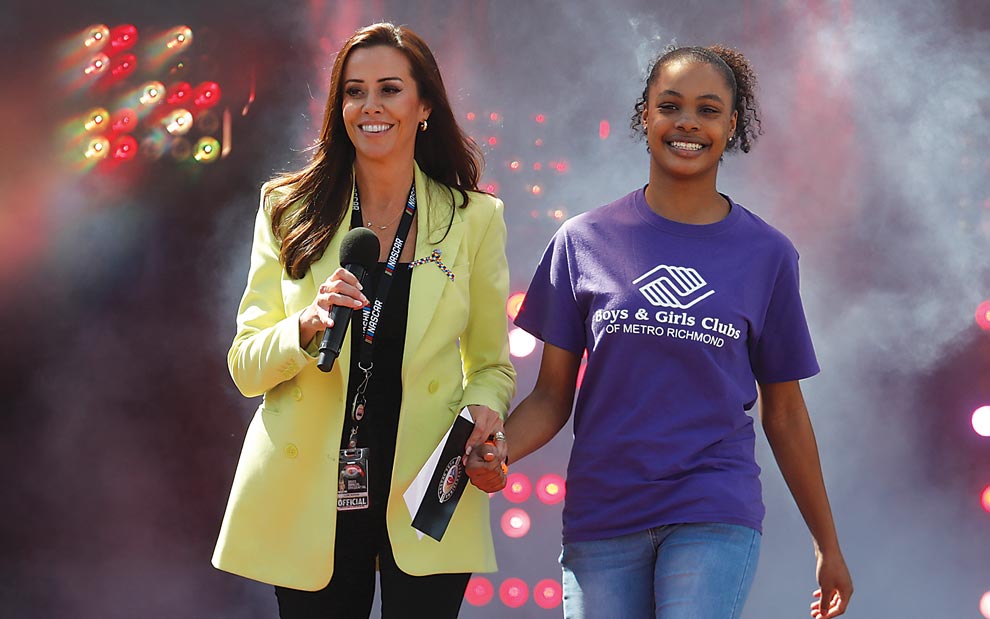
Stepping Up
Since taking over, Waran has made an effort to mentor young girls. She tries to bring teens up on stage with her to start each race. She also has them accompany her to meetings. Both are a way to help build their confidence. Even though they may feel a little uncomfortable at first, she believes they will look back on the experience in a positive light.
“It stays with them,” she says,
noting she often reaches out to the Boys and Girls Clubs of Metro Richmond to pick someone who may need a confidence booster.
Pre-race can be nerve-racking, but Waran offers encouragement. “I tell [the chosen girl] you might be scared, but it’s going to be okay when I do it with you,” she says. “When you hear 30,000 people cheering you on, it’s the coolest thing to hear. The young ladies usually cry at the end because they are so overwhelmed with joy.”
When it comes to encouraging marginalized communities, Waran is wholly invested. “My older son, who is twenty-two, is on the autism spectrum,” she says. She adds that when he was diagnosed at the age of two, autism wasn’t something people talked about. “I certainly didn’t understand it,” she says. “You might be surprised to learn that we have a number of fan families with children on the spectrum.”
A new initiative at Richmond Raceway offers sensory kits to families who have children with sensory integration dysfunction or who are on the autism spectrum. The free kits contain sensory headphones, a fidget toy, and identification to help team members identify children who may need help. The kits will be available at guest services.
“We also have a sensory room if it gets too overwhelming. It’s designed for them to have a moment with their parents and take a break,” Waran says. “If there is a small role we can play to help offset or mitigate any level of discomfort, then we want to help.”
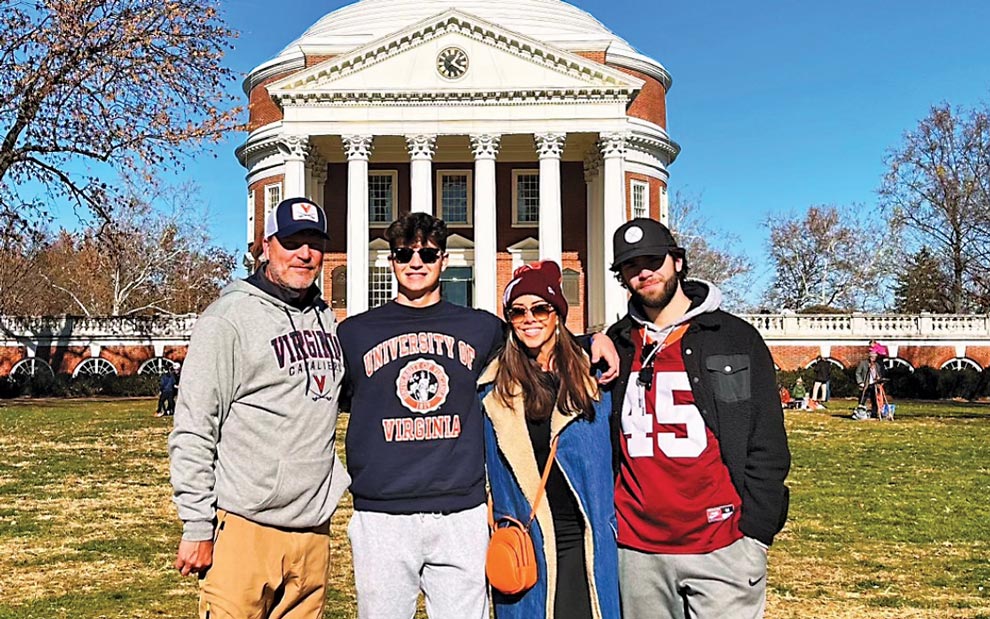
Building Community
When Waran started at the raceway, she was shocked to see barbed wire around the facility. One of her first actions was to have it removed. “It didn’t build up any sort of sense of community,” she says. “People in the community around the track had never been to the track.”
She wants that to change. She plans on having community nights that are free to the public to help promote harmony. “We need to have something in this town and region that brings us together and doesn’t divide us. If there is any role [Richmond Raceway] can play in that, I want us to do it,” she says.
In order to make the track uniquely Richmond, Waran commissioned local artists to create murals and posters. “Richmond is a creative town and we want to make sure that is displayed here as well,” she says.
She believes many people have forgotten about the racetrack in the last few years. “This is the only professional sport in all of the Commonwealth right now that is played on a major network in front of millions of people that highlights our region and state,” she says. “We are going to do that on Easter night with our race. It’s a unique opportunity to bring our community to the nation.”
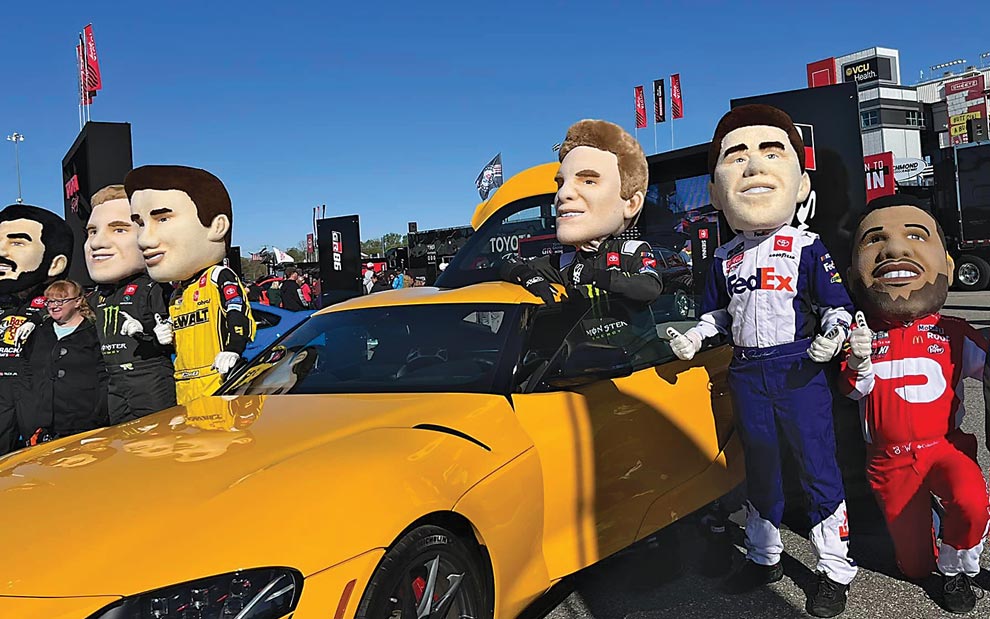
Life Away from the Track
As a mom, Waran loves being around her family and keeping up with her sons. “It’s a good feeling when you watch your younger ones become adults,” she says.
Being around her sons is always fun, she adds. “Watching them trade jokes and volley back and forth is my favorite pastime. I just enjoy hanging out with them. They are literally the best human beings.”
Waran says her life is on a great course now, both personally and professionally, and she can’t even imagine retirement. But if she were to change paths, what would her next venture be?
“I think I’d work at Lewis Ginter Botanical Garden,” she says, adding that is where she and her husband were married twenty-five year ago. “It’s peaceful and one of my favorite places in the world.”
And reaching into her bag of family memories, she has another backup plan. When Waran was young, she and her father had a big garden where they grew tomatoes – Hanover tomatoes, of course. There was no irrigation system, so in an effort to teach his daughter about the rewards of hard work, Waran’s father tasked her with filling up a five-gallon bucket of water for the tomatoes.
“I was five or six at the time,” she says. “It was so heavy. It was hot and man, it was awful work! But the reward of those juicy tomatoes was divine. Now, I have a garden of tomatoes – it’s the littlest, tiniest garden. So my second choice is to be a tomato grower.” And with a nod to her career in problem solving, the first female president of Richmond Raceway clarifies her point: “I would do away with that five-gallon water bucket. I’d find a better way to do it!”

